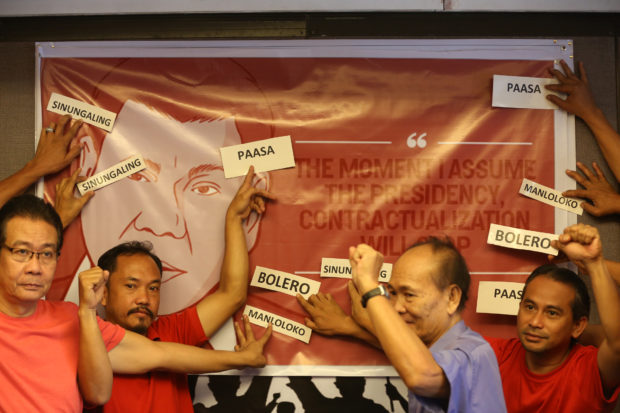Lack of Palace will to end contractualization angers labor groups

Bukluran ng Manggagawang Pilipino during a news forum in Quezon City, March 4, 2018, the group calls on organized labor especially the trade union movement to reject the compromise offer of President Duterte and struggle for an Executive Order to prohibit contractualization.
INQUIRER FILE PHOTO / NIÑO JESUS ORBETA
Labor groups on Tuesday lamented the government’s lack of political will following Malacañang’s admission that it could not end labor contractualization through an executive order by President Rodrigo Duterte.
Contractualization, which employers use to cut on labor costs by not regularizing the employment status of workers, gives workers no security of tenure.
Senior Deputy Executive Secretary Menardo Guevarra’s admission that the administration was powerless to ban “endo” (end of contract) sent several opposition lawmakers slamming the President for breaking his campaign promise to end the practice.
Endo refers to a contractualization scheme that offers short-term and unprotected temporary work arrangements.
The moderate Federation of Free Workers (FFW) criticized Guevarra’s pronouncement as a “self-constricted interpretation of labor laws,” insisting that an executive order (EO) can prohibit contractualization.
Article continues after this advertisementDraft EO
Article continues after this advertisementFFW vice president Julius Cainglet pointed out that Article 106 of the Labor Code granted powers to the labor secretary to regulate and prohibit contractualization.
“An executive order can declare prohibition of contractualization … The absence of political will is the problem,” Cainglet said, stressing that the continued abuse of workers merit decisive action.
Earlier, the Palace said it had been studying a draft EO being pushed by labor groups to end contractualization.
The EO proposed by labor groups would prohibit contractualization if it contravened the rights of workers to security of tenure, organize and collective bargaining.
Mr. Duterte had promised labor groups that he would study and sign an EO banning contractualization by March 15.
On Monday, Guevarra said the President could not issue the order, explaining that this could only be done through a new law amending the Labor Code.
An EO cannot amend a law, he said in a press briefing.
Safeguards for workers
The senior deputy executive secretary said the most Malacañang could do through an EO was to provide for the strict implementation of labor laws and add more safeguards for workers.
He said the executive department could still do something, such as calling on Congress to amend the Labor Code.
“These are not the strong words the labor sector came to believe in Mr. Duterte’s campaign trail and early in his administration when he unconditionally vowed to end contractualization,” Cainglet said.
He pointed out that while Malacañang had admitted that an EO was not enough to ban contractualization, it had yet to classify as urgent the passage of a bill on security of tenure (SOT).
“We defer to some sectors within the labor movement that maintain guarded optimism toward the signing of an executive order … [I]f he doesn’t sign one at all soon, he will completely lose the trust of the labor sector altogether,” the FFW official said.
House bill
The House of Representatives on Jan. 30 approved on third reading the SOT bill, which would prohibit labor-only contracting and subcontracting, but would not outlaw all forms of contractualization.
The bill is now with the Senate.
The Associated Labor Unions-Trade Union Congress of the Philippines said labor groups recognized the President’s concern that an absolute ban on contractualization was impossible.
Kilusang Mayo Uno chair Elmer Labog said that while an EO was not enough to eliminate contractualization, the order could still deter it. Partido Manggagawa chair Renato Magtubo maintained that his group would still hold the President to his campaign promise.
Anakpawis Rep. Ariel Casilao said Gueverra’s statement smacked of defeatism in terms of fulfilling Mr. Duterte’s campaign promise.
Magdalo Rep. Gary Alejano, of the opposition Magnificent Seven bloc, said the President’s promise to end endo was a false one “made to [win] public approval during election season.”